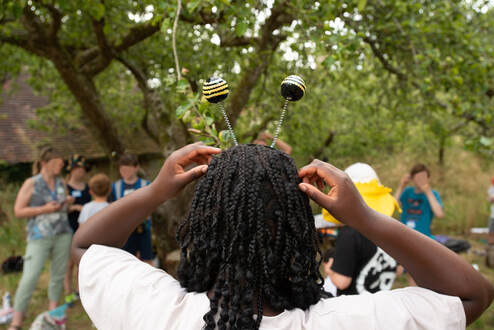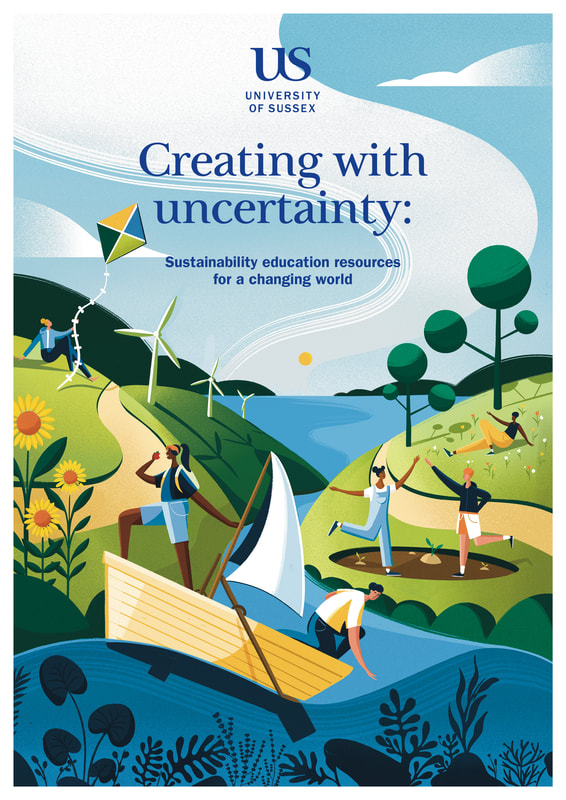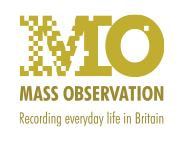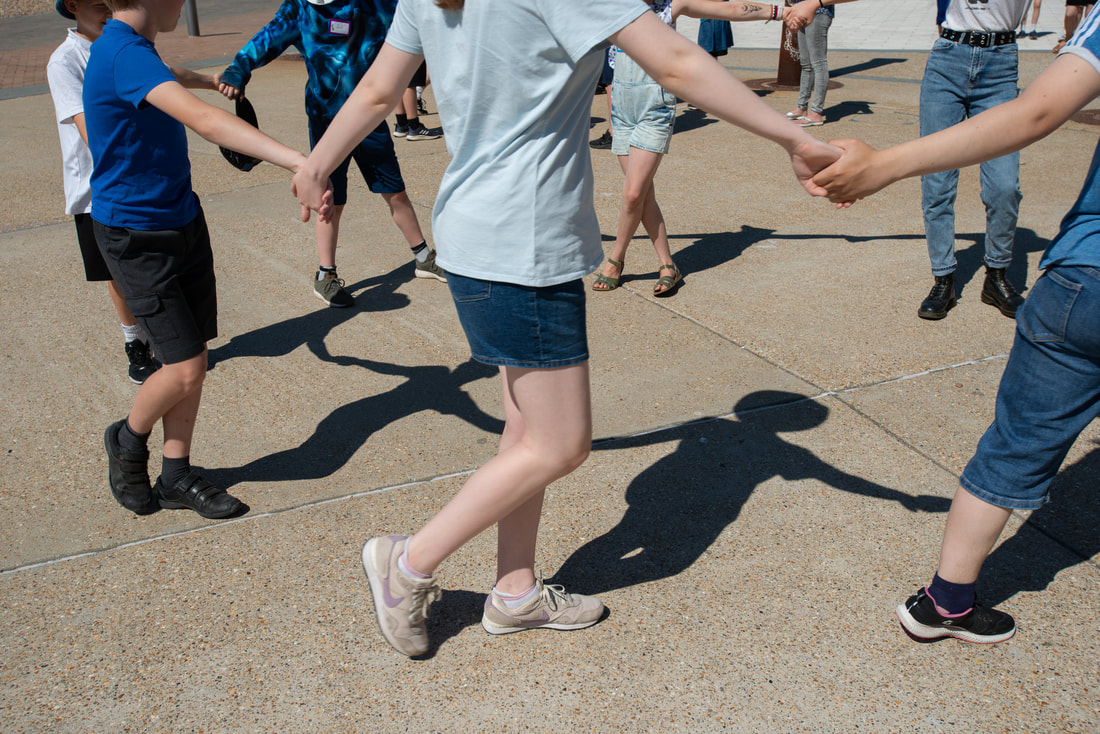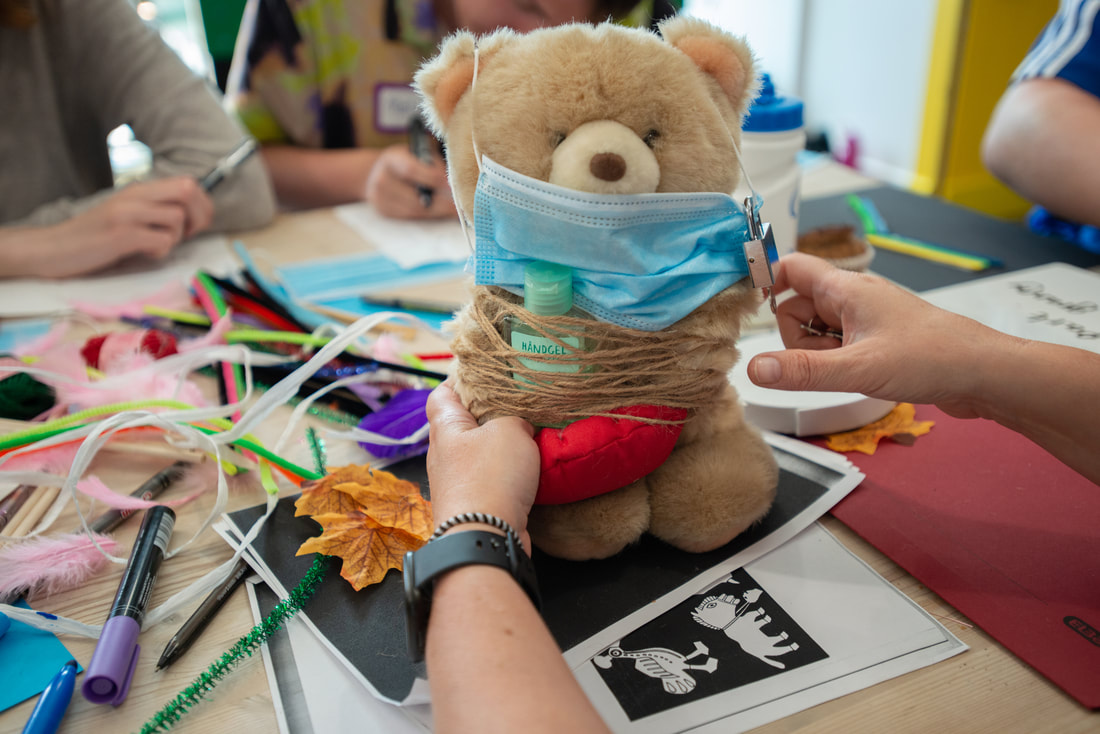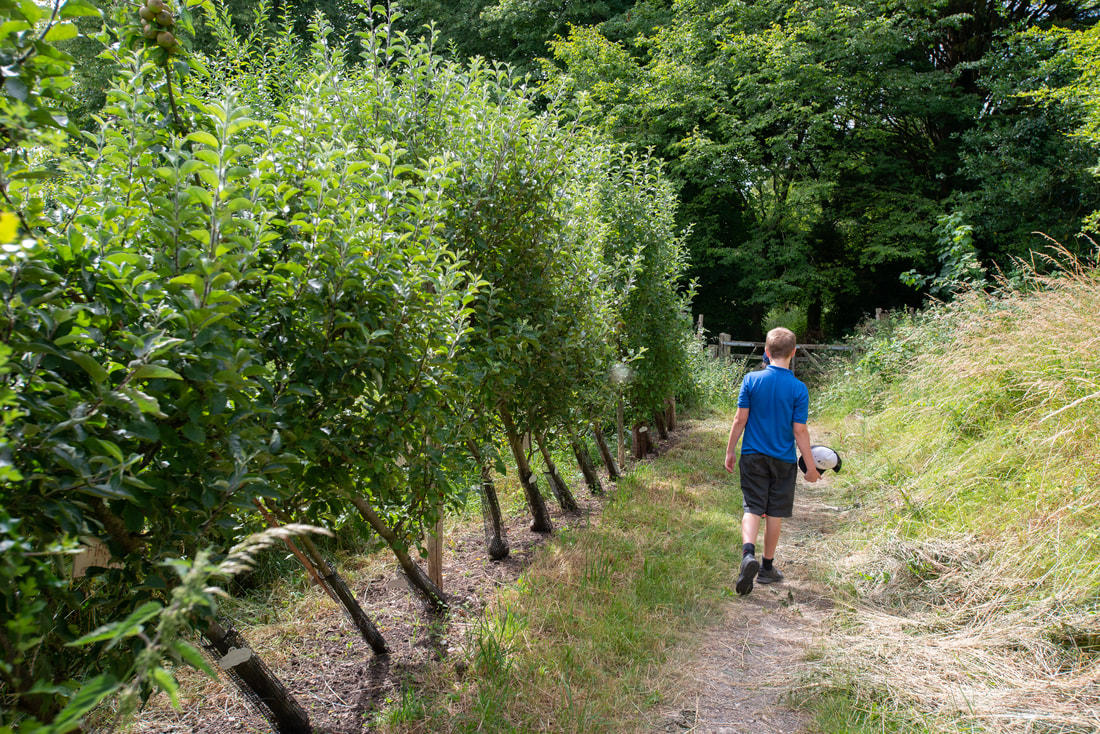OUR RESEARCH
|
Research on TRANSFORM-iN EDUCATION is aligned to children’s rights, agency, participation, voice, subjectivities, politics and democratic pedagogies.
Birdbath. Working with Prof. Alice Eldridge to support primary school children to attend to, and record, the sounds of the outdoors, as part of a Brighton Festival initiative entitled 'Bird Bath', that transforms beautiful buildings into restorative spaces by inviting the public to stop, rest and soak in the sound of local birdsong. We are interested in the possibilities of attending to sounds for opening-up pro-conservation sensibilities and action. (Arts and Humanities Research Council - Impact Acceleration Award) Farming Futures game development. This project, entitled Rooted Phase 1: Connecting with Local Food Systems, is the first phase of a proposed larger piece of research to develop an analogue farming game. This is a transdisciplinary project to sustainable agriculture in South-East England, unlocking the power of games, play and storytelling to engage stakeholders across the agri-food sector to foster understanding, empathy, and collaboration. The primary partners are: Richard Goring, Wiston Estate Farm, Washington, West Sussex; Sophie Robinson, Brighton and Hove Food Partnership (BHFP); Mark Webb, agricultural surveyor, WebbPaton; Miemie Neethling-Taylor, Director of Higher Education, Plumpton Agricultural College. This initial phase is funded by the Sussex Humanities Lab Digital Fund, and is being conducted together with Jim Jackson; Dr Michael Jonik; Dr Chris Sandom; Dr John Thompson; and Dr Jo Walton. Creating with Uncertainty resources and impact case study development. This extends our existing work undertaken to reconfigure schooling in ways that embrace a creative engagement with uncertainty within sustainability education. Firstly, it engages further two schools to expand their contribution to teaching aimed at transforming sustainability education. It provides the content for a written case study of teachers’ engagement with our work, as well as additional topics for the forthcoming second edition of Creating with Uncertainty resource. It is funded by a Knowledge Exchange & Impact (KEI) Fellowship. Cultural assembly: from Eco-anxiety to Climate Action We are supporting a project led by Professor Ann Light, together with Professor Alice Eldridge, both at the University of Sussex. This involves partners: ONCA (https://onca.org.uk/), which is a Brighton-based arts charity that bridges social and environmental justice issues with creativity; the De la Warr Pavilion; and Culture Declares Emergency (CDE: https://www.culturedeclares.org/) . It launches a cultural assembly on Earth Day (April 22nd, 2024) mobilising arts groups to consider (and attempt to mitigate) the rise in eco-anxiety among young people to existential levels. Creating with Uncertainty II: scaling education for net zero This project was a follow-up to one undertaken the previous year, again funded by the Higher Education Innovation Fund Higher Education Innovation Fund (HEIF) ‘Net Zero’ Partnerships call. It was conducted together with Dr John Parry, Prof Simon Thomson and Dr Michael Jonik. We delivered two workshops with schools teachers/leads in Brighton & Hove, and Lewes, from state-funded and private schools, in which they deliberated with faculty with sustainability expertise on the role of education for addressing sustainability. Creating with Uncertainty I: Covid recovery to education for sustainable futures Working with 10 schools (primary, secondary and special) to cultivate the capacity to respond where solutions are-as-yet-unknown (core to SDGs), enabling teachers and pupils to co-construct locally relevant, deeply engaging sustainability curricula that also acknowledge the existential and uncertain dimensions of the pandemic and climate change, and identify gaps in established knowledge/skills. This includes creating opportunities for teachers/pupils to relate facts to their own experiences (ie feelings, resources, practices, external pressures), to critically assess competing information sources, and navigate inherently difficult ethical tensions and questions. Undertaken together with Dr Michael Jonik (Media, Arts and Humanities), Dr John Parry and Prof. Simon Thomson (Education) . This research is funded by the Higher Education Innovation Fund (HEIF) in association with the Sussex Sustainability Research Programme (SSRP). (February to July 2022) Hope in the Present 2: translating uncertain pedagogies from the Global South to the Global North This project, with on class of Year 5 students (aged 9 to 10 years old) , in the UK, opened up space to engage with sustainability using creative and deliberative activities. It focuses on translating theoretical and practical conceptualisations of uncertainty into the practice and curricular space of schooling, extending Global South (funded by SSRP/IDCF) research into the immediacy of a Global North schooling context together with the Head teacher and senior leadership, class teacher and assistant and pupils aged 9-10 years. This work included the exhcange of objects that matter, between young people in India, Ecuador and the UK, resulting in an ESRC Festival of Social Science exhibition and workshops: Objects that matter: exhibition and creative workshop of ‘objects’ connecting children’s sustainability concerns across Global South-North. Children and young people took part in creative workshops in Jubilee Library, Brighton, to explore their concerns around sustainability and climate change and these concerns linked with their peers from India and Ecuador. This research is funded by the PASTRES Programme , the Centre for World Environmental History and the School of Education and Social Work, at the University of Sussex, plus the ESRC Festival of Science 2021. (Sept 2021- July 2022) Hope in the present 1: uncertain pedagogies for youth and community resilience in India and Ecuador Climate change and pandemics demand creative, critical and resilient civil societies. Educationally, this requires youth to acquire scientific knowledge, as well as to cultivate their capacity to respond where solutions are-as-yet-unknown (core to Sustainability Development Goal 4.7). We are working with an interdisciplinary team across the University of Sussex and academics in India (Dr Anindita Saha) and Ecuador (Dr Citlalli Morelos-Juarez) to explore the role of arts-based deliberative pedagogies for supporting youth to express relationships with sustainability uncertainties, in dialogue with stakeholders, with a view to fostering community resilience expressed through narratives of hope and action. The research project runs until July 2021 and is funded by International Development Challenge Fund (IDCF) & Sussex Sustainability Research Programme (SSRP), financed by the University's Global Challenges Research Fund (GCRF) allocation. See our blog. We write about this research in a chapter for the Routledge 2023 A Handbook of Children's and Young People's Participation . Covid-19 and educating for uncertainty We undertook a small-scale research project utilising the national Mass Observation archive. We analysed children and young people’s diaries from May 2020 to explore the unique experience of the first ‘wave’ of the Covid-19 ‘lockdown’. We presented interim findings to a seminar event at the Centre for Innovation and Research in Childhood and Youth in the autumn 2020 and completed the project 2021 (see box to the right). The analysis focused on what the diaries reveal about living with everyday uncertainties, offering insight into the young people's own practices and familial supports to navigate such uncertainties. This included looking at different registers of 'not-knowing', to see what this might reveal about how the pandemic was experienced by children and young people: including the diverse knowledges that diarists engage with; their feelings and embodiment; their engagement with spirituality and ethics; and their practices and use of material things. The research offers insights into the implications for how schools might support children and young people to live with, and respond to engage with life's uncertainties. A paper on this research is available here. Outdoor environmental education In 2020, we undertook work with teachers to introduce the concept and practice of engaging with the uncertainty of climate change, which included an outdoor INSET training event co-constructed with teachers. We interviewed teachers, including some who had been invovled in the outdoor event and others who were known for their interest (and activism) in climate change. This work informed a predominantly conceptual paper (to be published later in 2021) that examines ‘uncertainty’ and the politics of student engagement in climate change, both within and beyond the institution of the school. This work with teachers was funded by an ESRC-Impact award. See our blog. Doctoral Research The following two doctoral studies were conducted in schools between 2010 and 2018, a period of governmental and educational change in the UK. In the first, data was collected in 2011-12, when there remained a valuing of children’s participation and positive contribution; by the time of the second study, 2015-16, this had been replaced by an emphasise on teacher authority, discipline and control. These studies both opened up the importance of including an emphasis on uncertainty in education. Study One: Children's Rights and Participation in Primary School Rebecca’s PhD research was an ethnographic study conducted over 10 months in one school that championed ideas of children’s rights and participation, where they were placed at the heart of the school’s policies and practices. Rebecca was interested in the ways that children’s rights and participation became incorporated into the day-to-day experiences of all those in school (including children and adults). She was curious about what difference ideas of children’s rights make and to whom, and where and when and on what basis. Her research showed that the school was celebrated as a joyful and energising place by many, and that the attention given to the alleviation of some rules and regulations (such as school uniform, lining up, responding to buzzers, whistles, and bells) enabled many children to feel relaxed and carefree whilst at school. Nonetheless, the research also suggested that maintaining a participatory value-system is hard and demanding work amidst competing pressures. It requires constant openness to asking and listening to uncertain and difficult questions which need to challenge assumptions that everyone is always able to take part and to have a voice that can be heard and taken seriously. Study Two: Children’s Agency in the Primary Classroom Perpetua doctoral research offers detailed examples of children’s agency in the current Year One primary classroom. She spent time within an ordinary English primary school over the course of an academic year, and a week in a Year One class ‘outstanding’ teaching school. The research demonstrates how children achieve limited agency in navigating conformity. Children are highly competent at knowing what is expected of them, and put effort into being ‘good’, sitting silent and still for long periods, and into being ‘clever’, working hard to find the correct answer. Both get them only so far educationally. Being good can camouflage an avoidance of effort, and while a child may demonstrate they know expected answers, they can avoid engaging in new and unexpected challenges where there is no clue to the answer. The research also demonstrates how children achieve agency, in brief moments in the day, pursuing movement, humour, art and collaboration, to transform what it is possible to know, do and be. Often this is done alone without the support of the teacher. The research draws attention to the importance of the materiality of the classroom and children’s emotional vulnerability to not knowing. This research was funded by the ESRC. |
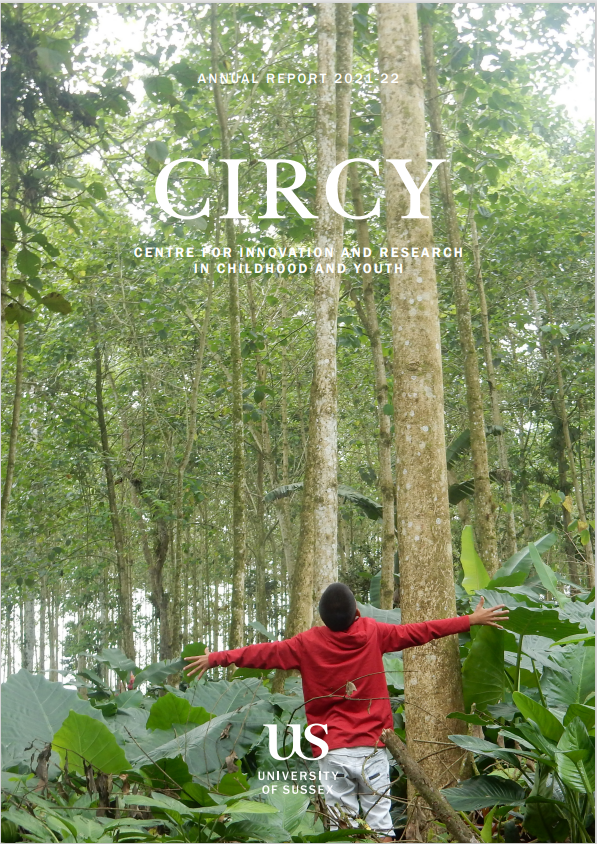
Our research is part of the Centre for Innovation and Research in Childhood and Youth (CIRCY), at the University of Sussex. See the CIRCY Annual Reports 2022 and 2021.
You can watch here an online presentation of our research using Covid-19 diaries at a seminar series, 'Using Mass Observation's Covid-19 Collections' , organised by Nick Clarke (University of Southampton) and Clive Barnett (University of Exeter), with Kirsty Pattrick and Jessica Scantlebury (Mass Observation), and support from the British Academy.
|
